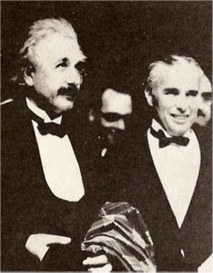They said about him ...
Texts by Dr. Antonio Moreno González
"Following confirmation of his general theory of relativity in 1919, Einstein became a national asset for German science, badly hit by the Great War and the political, social and academic tensions that had arisen in the country, [...] the man best able to help restore the reputation of German science in hostile foreign countries" (Fried Stern, Einstein's German World , 60)
Niels Bohr, after recounting his discussions- sometimes heated- with Einstein, who was radically opposed to the quantum uncertainty, wrote: "I hope, however, to have given a fair impression of how much it meant for me to profit from the inspiration we all obtain from any contact with Einstein" (Niels Bohr, Atomic physics and Human Knowledge , 82).
"EINSTEIN, the magician physicist of the sad, rounded face, in his innocent and unconscious moral halo of white curls-- the most pathetic face of today's world, even when he sticks his tongue out at reporters--repeats, to any one who wants to or has to or can hear him, that he can only be human in abstract, but can never unite in any way with anything individually human, not even with the most familiar or intimate" (Juan Ramón Jiménez, La corriente infinita , 265). "I have on my desk a book by Einstein that confirms my thesis. The book is called The World As I See It. It is a series of opinions about everything, and these opinions are utterly, utterly worthless. My concierge says things which are just as valuable, when he starts giving forth about the human and the divine. Mr. Einstein is probably a great physicist, though I won't make any such claim, because I do not consider myself enough of an expert on physics to give an opinion that is worth anything. But such a consideration does not halt the physicist's pen. While we men of moral and political science are hold physics in deep respect, physicists, on the other hand, move into our territory with the same liberty as if it were their own, and emerge with some simplistic remarks that would make anyone laugh" ("El bueno de Einstein", Obras , Ramiro de Maeztu, 236).
" In the petals of a rose
stands the formula:
E = mc2
I shall refuse to look away.
I shall refuse to let
my eyes
be crushed by the asphalt.
And God knows
I love the city"
("Ciudad", Libro de Alineaciones , Clara Janés)
"Before my window passes a man dressed with a blue jersey and flannel trousers, his hair tangled by the wind (two beautiful white locks in brilliant disorder)... He walks past every day at eleven o'clock. If it is cold, he wears a black coat. His hair tells me the direction of the wind, and his gaze makes my little daughter run and hide. What is he thinking about? From that brain came the equation that began to change the world. The equation looks new to me every time I see it: E = mc 2 ...nobody has ever said so much with so few signs" ( Lettres sur la bombe atomique , Denis de Rougemont)
They cheer me because they all understand me, and they cheer you because no one understands you", Charlie Chaplin to Einstein.

With Charles Chaplin (1889 - 1977) at the opening night of City Lights , 1931
